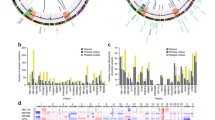Abstract
Aberrant activation of Ras signaling is a common finding in human glioblastomas. To determine the contribution of Ras gene mutations to this aberration, we screened 94 glioblastomas for mutations in the three Ras family genes NRAS, KRAS and HRAS. All tumors were additionally analyzed for mutations in BRAF, which encodes a Ras-regulated serine/threonine kinase with oncogenic properties. Mutation analysis of the entire coding regions of NRAS and KRAS, as well as the known mutation hot-spot sites in HRAS, identified somatic point mutations in two glioblastomas, both affecting codon 12 of NRAS (c.35G>A, p.G12D). Three additional tumors carried BRAF mutations altering the known hot-spot codon 599 (c.1796T>A, p.V599E). None of these five glioblastomas showed amplification of the EGFR or PDGFRA genes, while three of the tumors, including two with NRAS and one with BRAF mutation, demonstrated PTEN missense mutations or loss of PTEN mRNA expression. Taken together, our data suggest activating mutations in NRAS or BRAF as a molecular alteration that contributes to aberrant Ras signaling in a small fraction of glioblastomas.

Similar content being viewed by others
References
Boettner B, Van Aelst L (2002) The role of Rho GTPases in disease development. Gene 286:155–174
Bos JL (1989) Ras oncogenes in human cancer: a review. Cancer Res 49:4682–4689
Brat DJ, James CD, Jedlicka AE, Connolly DC, Chang E, Castellani RJ, Schmid M, Schiller M, Carson DA, Burger PC (1999) Molecular genetic alterations in radiation-induced astrocytomas. Am J Pathol 154:1431–1438
Burgart LJ, Robinson RA, Haddad SF, Moore SA (1991) Oncogene abnormalities in astrocytomas: EGF-R gene alone appears to be more frequently amplified and rearranged compared with other protooncogenes. Mod Pathol 4:183-186
Chunduru S, Kawami H, Gullick R, Monacci WJ, Dougherty G, Cutler ML (2002) Identification of an alternatively spliced RNA for the Ras suppressor RSU-1 in human gliomas. J Neurooncol 60:201–211
Cohen Y, Xing M, Mambo E, Guo Z, Wu G, Trink B, Beller U, Westra WH, Ladenson PW, Sidransky D (2003) BRAF mutation in papillary thyroid carcinoma. J Natl Cancer Inst 95:625–627
Davies H, Bignell GR, Cox C, et al (2002) Mutations of the BRAF gene in human cancer. Nature 417:949–954
Ding H, Roncari L, Shannon P, Wu X, Lau N, Karaskova J, Gutmann DH, Squire JA, Nagy A, Guha A (2001) Astrocyte-specific expression of activated p21-ras results in malignant astrocytoma formation in a transgenic mouse model of human gliomas. Cancer Res 61:3826–3836
Gomori E, Doczi T, Pajor L, Matolcsy A (1999) Sporadic p53 mutations and absence of ras mutations in glioblastomas. Acta Neurochir (Wien) 141:593–599
Guha A, Feldkamp MM, Lau N, Boss G, Pawson A (1997) Proliferation of human malignant astrocytomas is dependent on Ras activation. Oncogene 15:2755–2765
Holland EC, Celestino J, Dai C, Schaefer L, Sawaya RE, Fuller GN (2000) Combined activation of Ras and Akt in neural progenitors induces glioblastoma formation in mice. Nat Genet 25:55–57
Horiguchi K, Tomizawa Y, Tosaka M, Ishiuchi S, Kurihara H, Mori M, Saito N (2003) Epigenetic inactivation of RASSF1A candidate tumor suppressor gene at 3p21.3 in brain tumors. Oncogene 22:7862–7865
Kimura ET, Nikiforova MN, Zhu Z, Knauf JA, Nikiforov YE, Fagin JA (2003) High prevalence of BRAF mutations in thyroid cancer: genetic evidence for constitutive activation of the RET/PTC-RAS-BRAF signaling pathway in papillary thyroid carcinoma. Cancer Res 63:1454–1457
Knobbe CB, Reifenberger G (2003) Genetic alterations and aberrant expression of genes related to the phosphatidyl-inositol-3’-kinase/protein kinase B (Akt) signal transduction pathway in glioblastomas. Brain Pathol 13:507–518
Knobbe CB, Reifenberger J, Blaschke B, Reifenberger G (2004) Hypermethylation and transcriptional downregulation of the carboxyl-terminal modulator protein gene in glioblastomas. J Natl Cancer Inst 96:483–486
Lang FF, Miller DC, Koslow M, Newcomb EW (1994) Pathways leading to glioblastoma multiforme: a molecular analysis of genetic alterations in 65 astrocytic tumors. J Neurosurg 81:427–436
Maltzman TH, Mueller BA, Schroeder J, Rutledge JC, Patterson K, Preston-Martin S, Faustman EM (1997) Ras oncogene mutations in childhood brain tumors. Cancer Epidemiol Biomarkers Prev 6:239–243
Malumbres M, Barbacid M (2003) RAS oncogenes: the first 30 years. Nat Rev Cancer 3:459–465
Newton HB (2003) Molecular neuro-oncology and development of targeted therapeutic strategies for brain tumors. I. Growth factor and Ras signaling pathways. Expert Rev Anticancer Ther 3:595–614
Rajagopalan H, Bardelli A, Lengauer C, Kinzler KW, Vogelstein B, Velculescu VE (2002) Tumorigenesis: RAF/RAS oncogenes and mismatch-repair status. Nature 418:934
Reifenberger G, Collins VP (2004) Pathology and genetics of astrocytic gliomas. J Mol Med (in press)
Reifenberger J, Knobbe CB, Sterzinger AA, Blaschke B, Schulte KW, Ruzicka T, Reifenberger G (2004) Frequent alterations of Ras signaling pathway genes in sporadic malignant melanomas. Int J Cancer 109:377–384
Sambrook J, Fritsch EF, Maniatis T (1989) Molecular cloning: a laboratory manual, 2nd edn. Cold Spring Harbor Laboratory Press, Cold Spring Harbor, pp 9.17–9.19
Singer G, Oldt R 3rd, Cohen Y, Wang BG, Sidransky D, Kurman RJ, Shih IeM (2003) Mutations in BRAF and KRAS characterize the development of low-grade ovarian serous carcinoma. J Natl Cancer Inst 95:484–486
Van den Boom J, Wolter M, Kuick R, Misek DE, Youkilis AS, Wechsler DS, Sommer C, Reifenberger G, Hanash SM (2003) Characterization of gene expression profiles associated with glioma progression using oligonucleotide-based microarray analysis and real-time reverse transcription-polymerase chain reaction. Am J Pathol 163:1033–1043
Wolf RM, Draghi N, Liang X, Dai C, Uhrbom L, Eklof C, Westermark B, Holland EC, Resh MD (2003) p190RhoGAP can act to inhibit PDGF-induced gliomas in mice: a putative tumor suppressor encoded on human chromosome 19q13.3. Genes Dev 17:476–487
Acknowledgments
This study was supported by grants from the Deutsche Forschungsgemeinschaft (SFB503/B7, GRK320), the Deutsche Krebshilfe (70-3088-Sa1), and the Medical Faculty of Heinrich-Heine-University Düsseldorf (9772182).
Author information
Authors and Affiliations
Corresponding author
Rights and permissions
About this article
Cite this article
Knobbe, C.B., Reifenberger, J. & Reifenberger, G. Mutation analysis of the Ras pathway genes NRAS, HRAS, KRAS and BRAF in glioblastomas. Acta Neuropathol 108, 467–470 (2004). https://doi.org/10.1007/s00401-004-0929-9
Received:
Accepted:
Published:
Issue Date:
DOI: https://doi.org/10.1007/s00401-004-0929-9




